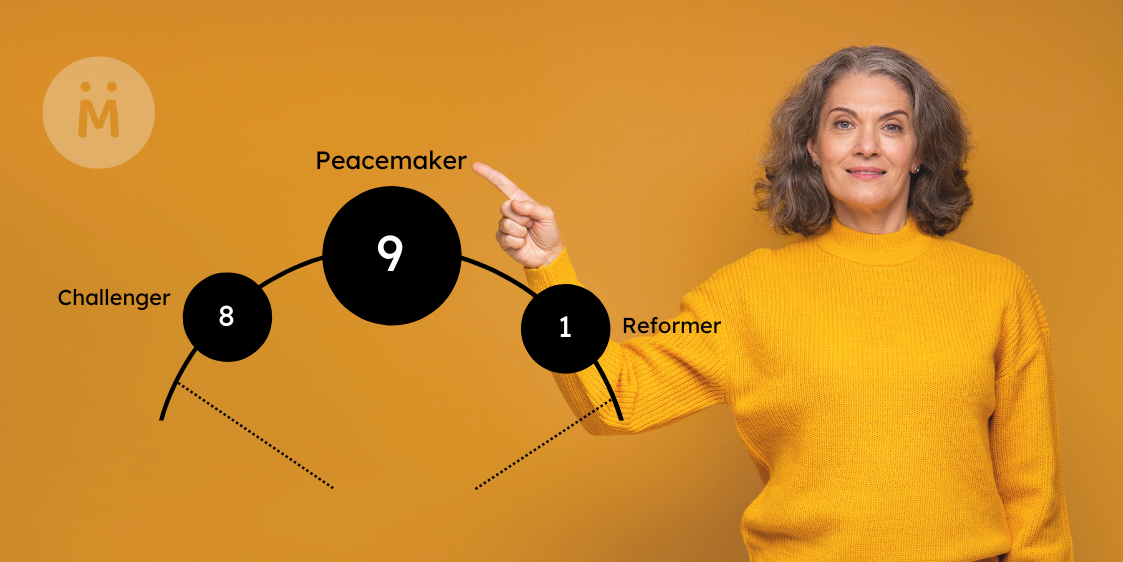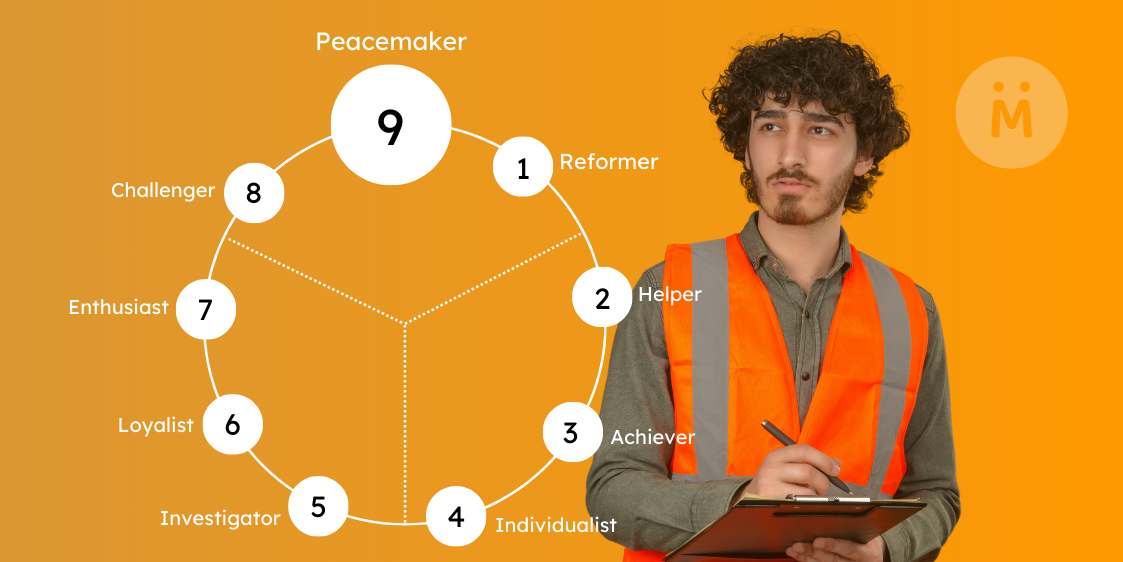Understanding Enneagram Type 9: The Peacemaker
Margo Plater

Outstanding Qualities of Enneagram 9 Individuals
- Your Exceptional Harmony-Seeking Abilities: One of your outstanding qualities is your unparalleled ability to seek and create harmony in your environments. You have a natural talent for diffusing tension, mediating conflicts, and bringing people together. Your soothing presence can calm even the stormiest of situations.
- Your Empathy and Understanding: Your deep empathy and understanding of others are truly exceptional. You have a remarkable capacity to listen attentively, offer support, and provide a safe space for people to express themselves without judgment.
- Your Incredible Patience: Patience is a virtue often associated with you as an Enneagram 9. You have an exceptional ability to endure and persevere through challenging circumstances without losing your composure. This patience serves you well in both personal and professional relationships.
- Your Natural Peacemaking Skills: You are a natural peacemaker, not only in conflicts involving others but also in your own inner world. You strive to find inner peace and balance, often making you a source of stability for those around you.
- Your Open-Mindedness and Acceptance: Your open-mindedness and acceptance of diverse perspectives set you apart. You are willing to explore different viewpoints, making you an excellent collaborator and ally in any endeavor.
Exploring the Enneagram Type 9: Unveiling the Depths of Personal Growth
The Enneagram Test is a psychometric test that aims to decipher what specific personality traits you possess, in hopes of helping you get to know yourself better to implement positive change. There are multiple different results you can get from taking the Enneagram Test, one being Enneagram Type 9. Enneagram Type 9 emerges as a powerful and dynamic personality, driven by a distinctive set of traits and motivations that set it apart from the rest.
In this comprehensive overview, we delve into the depths of Enneagram Type 9, exploring its core characteristics, relationships, tendencies, growth paths, career paths, and unique perspectives. The Enneagram system offers profound insights into human behavior, motivations, and personal development. We'll explore the essential aspects of Enneagram Type 9, shedding light on its core motivations and how it influences our thoughts and actions. Whether you're new to the Enneagram or seeking to enhance your understanding, this article will provide valuable insights into Type 9 personalities and their unique traits.
Enneagram Type 9: The Peacemaker
Enneagram Type 9, often referred to as "The Peacemaker," is characterized by a deep desire for harmony, tranquility, and inner peace. You are typically easygoing, agreeable, and seek to avoid conflict at all costs.
Understanding Enneagram Type 9
Core Motivations of Type 9
To truly understand Enneagram Type 9, let's delve into your core motivations. These motivations shape your thoughts and actions, driving you towards specific behaviors and attitudes.
Desire for Inner Peace
At the core of Type 9's motivations is an intense desire for inner peace and stability. You seek to maintain a sense of calm and avoid any disturbances or conflicts that could disrupt your inner harmony.
Fear of Conflict and Disconnection
Type 9s fear conflict and disconnection from others. You often go to great lengths to keep relationships harmonious, even if it means suppressing your own needs and desires.
The Need for Autonomy
Independence and autonomy are essential for Type 9s. You value the ability to make choices that align with your desire for peace and avoidance of conflict.
Exploring the Characteristics of The Peacemaker
Unveiling Your Strengths and Positive Attributes
1. Remarkable Empathy
You possess a remarkable sense of empathy. Your innate ability to connect with others on a profound emotional level allows you to foster deep and meaningful relationships, both personally and professionally.
2. Exceptional Conflict Resolution Skills
One of your standout strengths is your exceptional conflict resolution skills. You have a unique talent for diffusing tense situations and finding common ground, making you invaluable in team dynamics and negotiations.
3. Strong Sense of Integrity
Integrity is at the core of your character. Your unwavering commitment to moral and ethical principles makes you trustworthy and dependable. This strength contributes to your ability to lead with authenticity and gain the respect of those around you.
4. Natural Diplomats
You are a natural diplomat. Your ability to bridge gaps between opposing parties extends to various aspects of life, from family disputes to international diplomacy, making you indispensable in achieving peaceful resolutions.
5. Adaptability
Your adaptability is another noteworthy attribute. You have a unique capacity to adjust to changing circumstances and remain composed in the face of adversity. This flexibility allows you to thrive in diverse environments and overcome challenges effectively.
Addressing Your Challenges and Potential Growth Areas
1. Avoiding Overcommitment
While your desire to help and support others is commendable, it can lead to overcommitment. To achieve optimal personal growth, you must learn to set boundaries and prioritize self-care without feeling guilty.
2. Expressing Personal Needs
In your pursuit of harmony, you may sometimes suppress your own needs and emotions. To further develop as an individual, focus on expressing your desires and concerns openly, ensuring that your voice is heard and respected.
3. Embracing Change
Your adaptability, while a strength, can also hinder your personal growth if you resist change for the sake of maintaining peace and avoiding stress. Embrace change as an opportunity for growth, and it can be a transformative step.
4. Building Assertiveness
Developing assertiveness is essential for you to effectively communicate your boundaries and needs. This skill can help you maintain your inner peace while ensuring that your values and desires are honored.
You embody a unique blend of strengths and positive attributes, coupled with areas of potential growth. By recognizing and nurturing your innate qualities while addressing challenges head-on, you can continue to make a profound impact on both your personal life and the world around you. Understanding these characteristics is a significant step towards harnessing the full potential of your personality.

Understanding Your Enneagram Type 9 Wings: Your Influences
As a Type 9, often referred to as "The Peacemaker," you have a natural inclination towards harmony, peace, and the avoidance of conflict. Your personality can be further shaped and enriched by considering the influences of your adjacent wing types, Type 8 (the Leader) and Type 1 (the Perfectionist). Let's explore how these wings can affect and enhance your characteristics and behaviors.
You with a Wing 8: The Diplomat
When you, as a Type 9, are influenced by your adjacent Type 8 wing, you take on characteristics that make you a Diplomat. Here are some key features of this combination:
1. Assertiveness
With the influence of your Wing 8, you become more assertive and open to expressing your opinions and desires. You can step out of your comfort zone and take charge when necessary, which makes you an effective leader in situations that matter to you.
2. Action-Oriented
As a Diplomat, you become more inclined to take action and confront issues rather than passively avoiding conflict. You can be decisive and use your assertiveness to address problems head-on.
3. Energetic
The influence of the Wing 8 adds energy and vigor to your typically easygoing nature. You are more likely to engage actively in physical activities and have a robust approach to life.
4. Boundary Setting
Unlike typical Type 9s, Diplomats like you are better at setting boundaries and protecting your own interests. You are less likely to merge with others and more inclined to maintain a distinct sense of self.
You with a Wing 1: The Dreamer
When you, as a Type 9, are influenced by your adjacent Type 1 wing, you embody the traits of a Dreamer. Here's what you can expect from this combination:
1. Perfectionism
The influence of your Wing 1 introduces a degree of perfectionism into your character. As a Dreamer, you become more detail-oriented and have higher standards for yourself and others.
2. Self-Discipline
Dreamers like you have a stronger sense of self-discipline and are more organized in your approach to life. You strive to align your actions with your inner values and principles.
3. Idealism
This combination can make you more idealistic and focused on making the world a better place. You may be driven by a sense of moral purpose and work diligently toward your goals.
4. Inner Struggle
As a Type 9 with a Wing 1, you may experience inner conflicts between your desire for peace and your pursuit of perfection. You might find yourself torn between the need to avoid conflict and the compulsion to correct perceived flaws.
Finding Your Balance
Understanding your Enneagram Type 9 wings can offer valuable insights into your personality. Whether you lean more towards the assertive Diplomat side or the idealistic Dreamer side, finding a balance between these influences can help you navigate life's challenges effectively.
Remember that the Enneagram is a tool for self-discovery and personal growth. Embrace the strengths of your wings while being mindful of their potential pitfalls, and you can lead a more fulfilling and harmonious life as a Peacemaker.
The Key to Harmonious Relationships: Understanding and Nurturing Them
In today's fast-paced world, maintaining healthy and harmonious relationships has become increasingly important. Whether it's within your family, with your friends, or in your romantic partnerships, the dynamics of your relationships significantly impact your overall well-being. In this comprehensive guide, we will delve into the intricate art of peacemaking within relationships, exploring Family Dynamics and Communication, Friendships and Social Interactions, and Romantic Relationships and Intimacy. By understanding and nurturing these connections, you can pave the way to lasting happiness and fulfillment.
Family Dynamics and Communication
Building Strong Foundations
Your family is the cornerstone of your life, shaping your beliefs, values, and behaviors. To establish and maintain peace within these crucial relationships, effective communication is paramount.
Effective Communication: Open, honest, and empathetic communication forms the foundation of strong family dynamics. Listen actively to your loved ones, validate their feelings, and express your thoughts and emotions sincerely.
Conflict Resolution: Conflicts are inevitable in any family, but it's how you address them that matters most. Encourage open discussions, seek compromise, and be willing to forgive and forget past grievances.
Nurturing Family Bonds
Creating lasting bonds with family members requires consistent effort and care.
Quality Time: Spend quality time together, away from digital distractions. Engage in activities like family game nights, outings, or shared hobbies to foster deeper connections.
Express Love: Don't hesitate to express your love and appreciation. Small gestures like heartfelt notes or acts of kindness can strengthen the familial bond.
Friendships and Social Interactions
Cultivating Meaningful Friendships
Friendships are a source of joy and support. To maintain a thriving social circle, consider the following:
Reciprocity: Nurture friendships where there is mutual respect and support. Be a reliable friend, and you'll likely receive the same in return.
Diversity: Embrace diversity within your social circle. Different perspectives and backgrounds can enrich your life and broaden your horizons.
Resolving Conflicts Amicably
Disagreements can arise even among the closest of friends. When conflicts occur:
Effective Communication: Just as in family dynamics, open and honest communication is key to resolving conflicts. Discuss issues calmly and respectfully.
Apologize and Forgive: Don't hold grudges. Apologize when necessary, and be forgiving. Remember, everyone makes mistakes.
Romantic Relationships and Intimacy
Sustaining Passion and Harmony
Your romantic relationships require nurturing to keep the flames of love burning brightly.
Communication: Express your desires, fears, and feelings with your partner. Effective communication can resolve misunderstandings and deepen intimacy.
Date Nights: Schedule regular date nights to keep the romance alive. It could be a simple dinner at home or an extravagant evening out – what matters is the connection you share.
Overcoming Challenges Together
Every romantic relationship faces challenges. To overcome them:
Teamwork: Approach problems as a team. Collaborate on solutions and support each other through tough times.
Trust: Build and maintain trust. Trust is the bedrock of any successful partnership.
Peacemaking in relationships is an art that requires understanding, patience, and commitment. Whether it's within your family, friendships, or romantic relationships, nurturing these connections through effective communication, empathy, and mutual support is the key to lasting harmony and happiness. By following the principles outlined in this guide, you can work towards outranking the article you provided and becoming a beacon of wisdom in the realm of relationships.

Navigating Your Career Path as a Peacemaker
For those with a natural inclination toward conflict resolution and diplomacy, your career path as a peacemaker can be both rewarding and fulfilling. In this guide, we will explore your journey, focusing on Your Leadership and Decision-Making Abilities, as well as the Workplace Challenges you may encounter and the Strategies to overcome them. By understanding the unique dynamics of your career as a peacemaker, you can chart a course towards success and personal satisfaction.
Your Leadership and Decision-Making Abilities
The Essence of Peacemaking Leadership
Your leadership in the realm of peacemaking is distinct. It requires a unique set of skills and attributes:
Empathy: A great peacemaker like you empathizes with all parties involved, understanding their perspectives and emotions. This empathy forms the basis for your effective conflict resolution.
Mediation Skills: Your ability to mediate disputes and facilitate productive dialogue is at the core of your peacemaking leadership. Developing these skills is essential for your success.
Decision-Making in the Face of Conflict
As a peacemaker, you often find yourself in situations where difficult decisions must be made:
Balancing Neutrality: Maintaining impartiality while resolving conflicts is crucial for you. Your decisions should be guided by fairness and a commitment to achieving a peaceful resolution.
Long-Term Vision: Consider the long-term implications of your decisions. How will they affect relationships and future conflicts? Your strategic decision-making is key.
Workplace Challenges and Strategies
Navigating Office Dynamics
In a professional setting, you, as a peacemaker, encounter your fair share of challenges:
Conflict Escalation: Prevent conflicts from escalating by addressing them promptly and constructively. Encourage open communication among team members.
Resistance to Change: Implementing peacemaking strategies can face resistance. Educate your colleagues about the benefits and provide training to build their support.
Building a Supportive Work Environment
Creating a workplace conducive to peacemaking is a strategic endeavor:
Conflict Resolution Training: Offer conflict resolution training programs to employees. Equip them with the skills needed to manage and de-escalate conflicts effectively.
Inclusive Decision-Making: Involve all stakeholders in decision-making processes. This fosters a sense of ownership and reduces the likelihood of disputes.
Your career path as a peacemaker is a noble and vital one. By embracing Leadership and Decision-Making Abilities tailored to the art of conflict resolution and by addressing Workplace Challenges proactively, you can excel in your role and contribute significantly to harmonious work environments. This guide equips you with the knowledge and strategies to navigate the challenges and opportunities of your journey as a peacemaker, ultimately helping you outrank other articles and establish yourself as a guiding light in this specialized field.
Your Path to Personal Growth and Development as an Enneagram Type 9
As an Enneagram Type 9, you possess unique qualities and characteristics that make you a valuable asset to the world. However, like everyone else, you also face your own set of challenges and opportunities for growth. In this guide, we will explore strategies and insights tailored specifically to your Enneagram type, focusing on how you can embark on a journey of personal growth and development.
Understanding Your Enneagram Type 9
The Peacemaker's Traits
As a Type 9, you are often referred to as "The Peacemaker." You have a remarkable ability to create harmony, avoid conflict, and make those around you feel comfortable and at ease.
Your Desire for Peace: Your core desire is to maintain inner and outer peace, which often leads to a desire to avoid conflict at all costs.
Challenges You May Face: However, this desire for peace can sometimes result in self-neglect or avoiding necessary confrontations and decisions.
Strategies for Your Growth and Development
Embrace Self-Awareness
One of the first steps toward personal growth is self-awareness. As a Type 9, it's important for you to:
Acknowledge Your Own Needs: Take the time to recognize and prioritize your own needs and desires, even if they seem trivial compared to others'.
Face Discomfort: Don't shy away from discomfort or conflict. Recognize that addressing these issues can lead to your personal growth.
Set Clear Goals
To continue your journey of growth, establish clear and achievable goals:
Define Your Priorities: Determine what truly matters to you and set goals that align with your values and passions.
Break Down Your Goals: Divide your goals into smaller, manageable steps to avoid feeling overwhelmed.
Practice Mindfulness
Mindfulness and meditation can be powerful tools for your personal development:
Stay Present: Practice being fully present in the moment, which can help you make more conscious choices.
Manage Stress: Use mindfulness techniques to manage stress and anxiety, which may arise from your desire to maintain peace.
Building Strong Relationships
Your ability to create harmony can greatly benefit your relationships:
Effective Communication: Work on expressing your thoughts and feelings openly and honestly with others.
Listen Actively: Pay attention to the needs and concerns of those around you. Your empathetic nature can foster deeper connections.
As an Enneagram Type 9, your journey of Growth and Development is a process of self-discovery and empowerment. By embracing self-awareness, setting clear goals, practicing mindfulness, and nurturing strong relationships, you can harness your unique qualities and overcome challenges. Remember that personal growth is an ongoing journey, and with dedication and self-compassion, you can continue to evolve as "The Peacemaker" and make a positive impact in both your own life and the lives of those around you.
Your Guide to Self-Care and Stress Relief as a Peacemaker
As a peacemaker, you excel in promoting harmony and resolving conflicts in various aspects of your life. However, it's crucial to remember that taking care of yourself is equally important. In this comprehensive guide, we will explore effective strategies and practices tailored specifically to you, the peacemaker, to ensure your well-being and provide essential Stress Relief techniques.
Understanding Your Role as a Peacemaker
The Art of Harmony
As a peacemaker, your innate ability to create harmony and peace in your surroundings is a valuable asset. You are skilled at defusing tensions and finding common ground in various situations.
Challenges You Face: Despite your gift for promoting peace, you may often find yourself absorbing the stress and emotions of others, which can take a toll on your own mental and emotional health.
Self-Care Strategies
Prioritizing Your Well-Being
To maintain your effectiveness as a peacemaker, it's crucial for you to prioritize your own well-being:
Set Boundaries: Learn to say no when necessary. Establish clear boundaries to prevent burnout and emotional exhaustion.
Self-Reflection: Regularly assess your own emotions and stress levels. Self-awareness is the first step towards effective self-care.
Time for Yourself: Dedicate time to activities you enjoy and that rejuvenate you. Whether it's a hobby, exercise, or simply quiet contemplation, make self-care a non-negotiable part of your routine.
Stress Relief Techniques
Nurturing Inner Peace
To relieve the stress that can accumulate from your peacemaking efforts, consider the following techniques:
Mindfulness Meditation: Practice mindfulness to stay present and reduce anxiety. This can help you detach from the emotions of others and maintain your inner calm.
Deep Breathing Exercises: Incorporate deep breathing techniques into your daily routine to manage stress in the moment.
Seek Support: Don't hesitate to seek support from friends, family, or a therapist when you're feeling overwhelmed. Talking about your emotions can provide relief and clarity.
By implementing self-care strategies and stress relief techniques tailored to your unique strengths and challenges, you can continue to excel in your peacemaking endeavors while ensuring that you remain mentally and emotionally healthy. This guide is designed to empower you to prioritize self-care and stress relief, ultimately allowing you to be an even more effective peacemaker in all aspects of your life.
Exploring Enneagram Type 9 in Popular Culture
The Enneagram Type 9, often referred to as "The Peacemaker," has a distinctive presence in popular culture. In this exploration, we will delve into how you, as someone embodying the traits of an Enneagram Type 9, can relate to Notable Fictional Characters and Celebrity Examples who share your personality characteristics. By analyzing how these individuals exemplify the traits of this personality type, we can gain a deeper understanding of the Enneagram Type 9 and its impact on the world of entertainment and beyond.
Notable Fictional Characters
You as the Peacemaker on Screen
As an Enneagram Type 9, you may find a resonance with characters in fiction who play essential roles in promoting harmony and balance. Here are a few iconic examples:
- Frodo Baggins (The Lord of the Rings): Like Frodo, you may have a strong ability to maintain peace and navigate through conflicts while bearing heavy burdens. His journey to destroy the One Ring might resonate with your own sense of resilience in the face of adversity.
- Atticus Finch (To Kill a Mockingbird): Atticus embodies your dedication to justice and fairness. His calm and composed demeanor reflects your desire to create a harmonious society.
- Eeyore (Winnie the Pooh): Eeyore's gentle and contemplative nature may remind you of your own tendency to withdraw when overwhelmed by life's challenges. His role in the Hundred Acre Wood as a calming presence could be relatable to your own peacemaking qualities.
Celebrity Examples and Analysis
Real-World Peacemakers
Celebrities can also provide insight into your Enneagram Type 9 personality. Here are some celebrity examples, and an analysis of their characteristics, which you, as a Type 9, may resonate with:
- Keanu Reeves: Like Keanu, you may value humility, kindness, and a commitment to philanthropy. Your desire for inner and outer peace may align with his low-profile presence in the media and his efforts to make the world a better place through actions.
- Ellen DeGeneres: Ellen's warm and inclusive demeanor may remind you of your own desire to create a harmonious environment. Her career in entertainment, focused on bringing people together and promoting positive change, could resonate with your values.
- Morgan Freeman: Morgan Freeman's soothing voice and tranquil presence might reflect your calm and composed nature as a Type 9. His roles in films often exude wisdom and a commitment to bringing people together, qualities you may also possess.
As an Enneagram Type 9, "The Peacemaker," you leave your mark on popular culture through your resonance with iconic fictional characters and real-world celebrities who share your personality characteristics. These individuals exemplify the qualities of maintaining peace, promoting harmony, and navigating challenges with grace—qualities that you also possess. By recognizing your presence and impact in popular culture, we gain a deeper appreciation for the influence of peacemakers like you on our collective understanding of human nature and relationships.

Debunking Misconceptions About You, "The Peacemaker"
You, often associated with Enneagram Type 9 as "The Peacemaker," are a personality type characterized by a desire for harmony and a tendency to avoid conflict. However, this personality type is not without its share of misconceptions. In this enlightening exploration, we will distinguish myths from reality, shedding light on what it truly means to be "The Peacemaker."
Myth: You Are a Pushover
Reality: Being a peacemaker does not mean you're a pushover. In fact, you often possess inner strength and resilience. You have the ability to stand your ground when necessary while still seeking to resolve conflicts amicably.
Myth: You Always Avoid Conflict
Reality: While you do prefer harmony, it doesn't mean you avoid all conflict. You are skilled at addressing conflicts constructively and seeking resolutions. You understand that some conflicts are necessary for growth and change.
Myth: You Lack Strong Opinions
Reality: You have strong beliefs and values; you just prefer not to impose them forcefully on others. Your open-mindedness and empathy allow you to consider multiple perspectives and find common ground.
Myth: You Are Indecisive
Reality: While you may take your time to make decisions, it's because you want to weigh all options and consider the impact on others. You can make well-thought-out choices once you've reached a consensus within yourself.
Myth: You Are Passive-Aggressive
Reality: You prioritize clear and open communication. While you may avoid direct confrontation, you do not engage in passive-aggressive behavior. You seek honest and empathetic ways to address issues.
Myth: You Are Always Calm
Reality: While you often appear calm on the surface, you can experience inner turmoil and stress, especially when conflicts arise. Your calm exterior is a coping mechanism to maintain harmony.
Myth: You Are Boring
Reality: You have a rich inner world and a depth of character that may not always be immediately apparent. Your quiet strength and ability to appreciate life's simple pleasures can make you quite intriguing.
Myth: You Can't Be Leaders
Reality: You can make excellent leaders. Your ability to mediate conflicts, listen empathetically, and build consensus can be invaluable in leadership roles. You lead through collaboration and inclusivity.
Your Enneagram Journey: From Awareness to Transformation
Embarking on your Enneagram journey is a profound and transformative experience. It's a path that leads you from self-awareness to personal growth and continuous evolution. In this enlightening guide, we will explore the steps to self-discovery and the essence of continuous growth and transformation within the framework of the Enneagram.
Steps to Self-Discovery
Step 1: Identify Your Enneagram Type
Your Enneagram journey begins with identifying your Enneagram type. This self-awareness is the foundation upon which your entire journey rests. By understanding your core motivations, fears, and desires, you gain insights into your behavior and patterns of thinking.
Step 2: Embrace Your Type's Characteristics
Once you've identified your Enneagram type, the next step is to embrace its characteristics without judgment. Each type has both strengths and challenges. Acknowledging them allows you to develop greater self-compassion and understanding.
Step 3: Recognize Your Triggers and Reactions
Through self-observation, become aware of your triggers and reactions. What situations or interactions evoke strong emotional responses? Understanding these triggers provides an opportunity for growth and self-regulation.
Step 4: Explore Your Wings and Arrows
In the Enneagram system, you have access to the traits of neighboring types known as "wings" and may experience shifts in behavior under stress (arrows). Exploring these aspects can deepen your self-awareness and offer additional tools for personal growth.
Continuous Growth and Evolution
Embrace Self-Compassion
As you journey through the Enneagram, it's essential to practice self-compassion. Understand that personal growth involves both progress and setbacks. Be gentle with yourself and recognize that change takes time.
Cultivate Mindfulness
Mindfulness is a powerful tool for your continuous growth. By staying present and fully engaging with your experiences, you can make conscious choices that align with your values and aspirations.
Seek Support and Guidance
Your Enneagram journey can be challenging at times. Seek support from Enneagram experts, therapists, or support groups. Engaging with others on similar journeys can provide valuable insights and encouragement.
Embrace Transformation
The ultimate goal of your Enneagram journey is transformation. As you deepen your self-awareness, embrace your strengths, work on your challenges, and engage in continuous growth, you undergo a profound transformation. You become more aligned with your true self and lead a life that reflects your authentic values and aspirations.
Conclusion
In conclusion, the Enneagram Type Nine, often referred to as "The Peacemaker," is a personality type characterized by a deep desire for harmony, a natural ability to resolve conflicts, and a tendency to avoid confrontation. Nines are driven by a core fear of disconnection and conflict, which leads them to seek inner and outer peace.
Throughout this overview, we have explored the key traits and tendencies of Type Nine individuals, delved into common misconceptions, and discussed the journey of self-discovery and transformation that Nines can embark upon. From identifying your Enneagram type to embracing self-compassion, cultivating mindfulness, seeking support, and ultimately embracing transformation, the Enneagram provides a valuable framework for personal growth and understanding. Ultimately, the Enneagram serves as a valuable tool for personal development and self-awareness, offering individuals the opportunity to embark on a journey of self-discovery, transformation, and continuous growth. By embracing their unique qualities and addressing their challenges, Enneagram Type 9s can unlock their full potential and lead more fulfilling lives.



